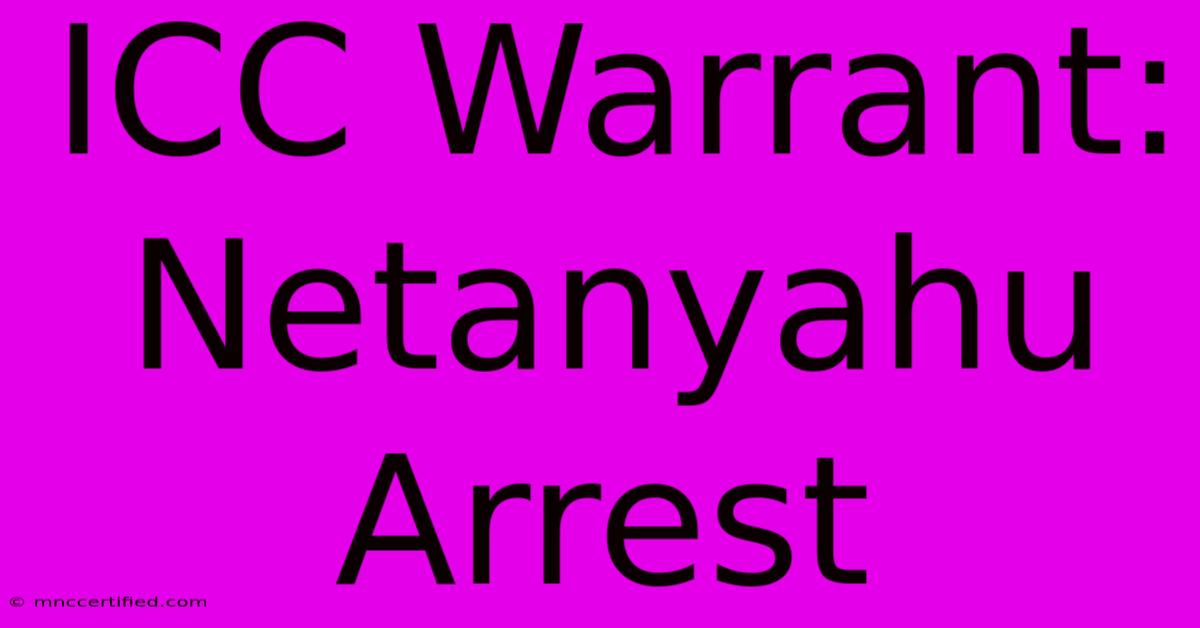ICC Warrant: Netanyahu Arrest

Table of Contents
ICC Warrant: Netanyahu's Arrest – A Deep Dive into the International Implications
The recent issuance of an International Criminal Court (ICC) arrest warrant for Benjamin Netanyahu, Israel's former Prime Minister, has sent shockwaves through international relations. This article delves into the complexities of the situation, examining the warrant's implications for Israeli-Palestinian relations, international law, and Netanyahu's political future.
Understanding the ICC Warrant
The ICC warrant alleges war crimes and crimes against humanity committed against Palestinians in the occupied territories. Specifically, the charges relate to the illegal settlement expansion and the transfer of Israeli civilians into occupied territories. These are violations under the Rome Statute, the treaty that established the ICC. It's crucial to understand that this warrant doesn't automatically mean Netanyahu will be arrested. The ICC has limited enforcement power and relies on member states' cooperation. However, the warrant significantly raises the stakes and creates a precarious legal and political landscape.
Key Aspects of the Warrant:
- Allegations of War Crimes: The warrant details specific actions allegedly constituting war crimes, focusing on policies implemented during Netanyahu's tenure.
- Jurisdiction: The ICC's jurisdiction is a key point of contention. Israel is not a signatory to the Rome Statute, but the ICC asserts jurisdiction based on the principle of territoriality, given that the alleged crimes occurred in the occupied Palestinian territories.
- Political Ramifications: The warrant has ignited heated debate within Israel and internationally, highlighting the deep divisions surrounding the Israeli-Palestinian conflict.
Implications for Israeli-Palestinian Relations
The ICC warrant undeniably exacerbates the already fragile Israeli-Palestinian relationship. It strengthens the Palestinian narrative of Israeli aggression and impunity, potentially fueling further tensions and hindering peace negotiations. For Israel, the warrant is seen as an infringement on its sovereignty and a biased application of international law. This perception is likely to reinforce existing mistrust and complicate any future diplomatic efforts. The situation could easily escalate, leading to further violence and instability in the region.
Potential Outcomes:
- Increased Tensions: The warrant's issuance could spark further protests and clashes between Israelis and Palestinians.
- Stalled Peace Process: Any possibility of renewed peace negotiations seems even more remote in the wake of this development.
- International Condemnation: The warrant has drawn reactions from various countries, some supportive of the ICC's actions, others critical.
International Law and Sovereignty
The warrant raises critical questions about the balance between international law and national sovereignty. Israel argues that the ICC's investigation is illegitimate and infringes upon its right to self-determination. The ICC, on the other hand, maintains its jurisdiction based on the alleged crimes committed within its defined territory. This ongoing debate highlights the inherent tensions between national interests and the pursuit of international justice.
Legal Challenges:
- Jurisdictional Disputes: The ICC's jurisdiction over Israel remains a central point of legal contention.
- Political Interference: Concerns exist regarding potential political influence on the ICC's investigations and decisions.
- Enforcement Challenges: The ICC's ability to enforce its warrants depends heavily on the cooperation of states, which is often a complex political issue.
Netanyahu's Political Future
The warrant casts a significant shadow over Netanyahu's political future, both domestically and internationally. While the immediate impact might be limited due to Israel's non-cooperation with the ICC, it undoubtedly impacts his image and standing on the world stage. The allegations themselves, regardless of eventual legal outcomes, damage his reputation and could affect his ability to engage in international diplomacy or seek future political office.
Potential Scenarios:
- Limited Domestic Impact: Netanyahu’s domestic support may not be significantly affected, particularly within his political base.
- International Isolation: The warrant could lead to international limitations on his travel and interactions with foreign leaders.
- Legal Battles: Netanyahu will likely face protracted legal challenges and appeals against the ICC's decision.
Conclusion: A Complex and Evolving Situation
The ICC warrant for Benjamin Netanyahu is a multifaceted event with profound implications for Israeli-Palestinian relations, international law, and global politics. The situation is dynamic and likely to unfold over a considerable period, involving legal battles, political maneuvering, and potentially increased regional tensions. The long-term consequences remain uncertain, but the warrant has undoubtedly created a new chapter in this complex and enduring conflict. Further developments warrant close monitoring and analysis.

Thank you for visiting our website wich cover about ICC Warrant: Netanyahu Arrest. We hope the information provided has been useful to you. Feel free to contact us if you have any questions or need further assistance. See you next time and dont miss to bookmark.
Featured Posts
-
Judge Overturns Smollett Verdict
Nov 22, 2024
-
New Russian Missile Hits Ukraine Putin Confirms
Nov 22, 2024
-
One Main Financial Car Insurance
Nov 22, 2024
-
Auto Insurance Endorsement Codes
Nov 22, 2024
-
Affiliated Insurance Highland Il
Nov 22, 2024